- Home
- Joe R. Lansdale
Sunset and Sawdust
Sunset and Sawdust Read online
Table of Contents
Title Page
Dedication
Epigraph
Praise
Chapter 1
Chapter 2
Chapter 3
Chapter 4
Chapter 5
Chapter 6
Chapter 7
Chapter 8
Chapter 9
Chapter 10
Chapter 11
Chapter 12
Chapter 13
Chapter 14
Chapter 15
Chapter 16
Chapter 17
Chapter 18
Chapter 19
Chapter 20
Chapter 21
Chapter 22
Chapter 23
Chapter 24
Chapter 25
Chapter 26
Chapter 27
Chapter 28
Chapter 29
Chapter 30
Chapter 31
Chapter 32
Chapter 33
Chapter 34
Chapter 35
Chapter 36
Chapter 37
About the Author
ALSO BY JOE R. LANSDALE
Copyright Page
For Kasey
In East Texas, myth, lies, legend, and reality are all the same.
—H. Collins, lifelong East Texas resident
Acclaim for JOE R. LANSDALE’s Sunset and Sawdust
“Delivers the unexpected and bizarre that his fans have come to expect. . . . The narrative is entertaining, but Lansdale’s patently unvarnished storytelling—backwoods and brash all at once—is the real reason to crack this cover.” —Texas Monthly
“Funny, bloody and bizarre. . . . Another five-star doozy of a tale from an immensely talented and original storyteller.” —The Flint Journal
“Sunset Jones is the kind of woman that men who drink in East Texas bars would call a ‘pistol.’. . . Sunset has her own posse, including a wonderful dog whose abject adoration of the fiery gunslinger pretty much sums up this reader’s feelings.” —The New York Times Book Review
“A first-rate whodunnit. . . . [Lansdale] knows how to tell a story.”—The Globe and Mail (Toronto)
“Sly, easy-paced and so comfortable in its setting that it becomes almost seductive. This is what good storytelling is all about.”—The Arizona Republic
“Lansdale can catch that meandering East Texas twang in his writing, but just as quickly he can tighten the plot and our stomachs with a turn of phrase. . . . Lansdale gives us both atmosphere and action.”—Winston-Salem Journal
“Surrealistic. . . . Unpredictable. . . . A darker kind of storytelling.”—Pittsburgh Tribune-Review
1
On the afternoon it rained frogs, sun perch, and minnows, Sunset discovered she could take a beating good as Three-Fingered Jack. Unlike Jack, who had taken his in the sunshine, she took hers in her own home at the tail end of a cyclone, the windows rattling, the roof lifting, the hardwood floor cold as stone.
She was on her back wearing only the top half of her dress, because the bottom half had been ripped away when Pete, during the process of beating her, had stepped on it, and the dress, rotten as politics, had torn and left her clothed only from waist to shoulders.
It went through her mind that she was down to two dresses now, and that she hated to see this one go, as it, though faded, had a flowery pattern she liked and the colors blended well with the stains.
But this was a passing thought. She was mostly thinking: How can I stop him from hitting me? She was trying to do this by holding her hands up, but he was beating them down, and her own arms and hands flying back into her face were doing near the damage his fists might have.
Finally, he hammered her to the floor, followed her down, spread her legs, went to tearing and clawing off the rest of her clothes.
When the top of her dress ripped open and he jerked loose one side of her bra, revealing her, he said, “There’s that tittie.” His speech was slurred and his breath seemed to bleed alcohol.
He raked at her undergarments, tore them and tossed them. When he snapped his gun belt free, he tossed it nearby, and while he was on her, tugging at his zipper, trying to put the mule in the barn, Sunset reached over and slipped his .38 revolver from its holster, and without him being aware, put it to his head, gave him one in the temple.
When she pulled the trigger the shot was loud as Gabriel blowing her up to heaven, but it was Pete who went to heaven. Or departed anyway. Sunset liked to think he got a nice chair in hell, right next to the oven.
But in that moment, the shot made her scream, once, sharp and hard as if she had taken the bullet, or as if she had just received a slap on the bottom at birth.
Pete went limp, not only in the organ he had intended to use, but all over. He said not a word. No “Ouch,” “Oh shit,” or “Can you believe that?” Things he liked to say under normal circumstances, moments of surprise and duress.
He just took the hot load, cut a fart near loud as the .38 shot, collapsed, and rode on out on Death’s black horse.
If it wasn’t bad enough she had lost her dress, underclothes, and dignity, now all the windows on the east side shook like Marley’s chains, then exploded. The door leaped apart as if it had never been anything other than a loosely connected puzzle, and the wind took the roof away.
She lay there on her back, fragments of clothes fastened to her body, her old flat-heeled shoes still on her feet, a piece of window glass poking out of her shoulder, Pete lying heavy against her. She still had the gun in her hand. The shot had gone in small and hadn’t come out big like she expected. It must have been a bad load, jumping around in his brain, making jelly of it. Blood ran from the wound, out of his nose and onto her.
She rolled him off and looked at him. No mistaking. He wasn’t going to recover from this.
“Surprised you, didn’t I?” Sunset said.
She studied Pete for a long moment, then started to scream as if a banshee were inside of her. But it wasn’t screaming you would have heard if you had been in the other room. It was loud enough, but the storm was louder. The house rocked, squeaked, squealed, and whined.
Then, except for the floor, two ugly chairs, an iron cookstove, Sunset and the dead man, it was all sucked up and thrown lickety-split on down country.
Sunset, screaming, clung to the floor while the storm raved on.
The moment the storm passed, the sky turned clear and the sun poked out and stoked up the heat. It was as if the cool wind and rain had never been.
Sunset stood up, weak and bleeding, fragments of her clothes falling from her. She pulled the piece of glass from her shoulder. It came out smooth without causing too much damage, hardly any blood.
Naked, except for her shoes and the gun she was holding, she wandered off of what remained of her house, stumbled down the muddy clay road in front of the place, frogs, minnows, and perch hopping and flapping beneath her shoes.
She felt as lost as Cain after he killed Abel.
She saw Pete’s car, turned over and smashed up, bent in half between two big oak trees as if it had been made of wet licorice. Nearby, his wooden file cabinet was burst open and there were files all over the place.
Fatefully, she came across one of her curtains, made from a flour sack and dyed blue. It had wrapped itself around a scrub tree limb and was hanging there like it was on the arm of a valet.
Sunset draped it around the lower part of her body, pulled her long red hair down over her breasts, started down the road again, mud squishing around her shoes.
Stooping to yank a mashed frog from the bottom of her shoe, she looked up to see the colored knife sharpener, Uncle Riley, coming down the road with his two mules and wagon. U
ncle Riley’s son, Tommy, was walking alongside him, spearing sun perch from the ground with a sharp stick, flipping them into the wagon bed.
Uncle Riley pulled on the reins when he saw her, said, “Oh, hell. Now I ain’t looking, Miss White Woman. Really. And Tommy, he ain’t neither. We ain’t seeing a thing.”
But Tommy was seeing plenty. Sunset’s breasts were poking through her red hair, and Tommy had never seen breasts before, white or black, except those of his mama when suckling, but that was a long-lost memory.
Sunset, at that moment, didn’t care who saw what. She was bleeding from nose and mouth and her eyes were starting to swell shut. She felt as if she had been set on fire and put out with a yard rake.
“Uncle Riley,” she said, “it’s me, Sunset. I been beat.”
“Oh, Lord, chile, you sure have. I’m gonna get down and help you. Don’t shoot at nothing now, you hear?”
Sunset staggered to one knee, tried to get up, couldn’t.
Uncle Riley, who was six-four and forty-four, weighed two-twenty and had a slick bald head he covered with a droopy hat, climbed down from the wagon, took off his work shirt, kept his head turned as he walked toward her.
Uncle Riley put the shirt over Sunset’s shoulders. She dropped the curtain and pulled the shirt shut and buttoned it with her free hand. All this from where she knelt on one knee. She tried again to get up, but couldn’t. Uncle Riley lifted her into his arms easy as a child. She clung to the pistol as if it were a part of her hand.
He carried her to the wagon and set her on the seat, climbed up beside her. “Now I ain’t touching on you, Miss Sunset.”
“It’s okay, Uncle Riley. You’ve been a real gentleman.”
Tommy, who was standing beside the wagon with a fish stuck on the end of his pointed stick, had yet to close his mouth.
“Get on up here,” Uncle Riley said.
Tommy climbed in the back of the wagon with the fish they had been collecting. They were scattered from one end of the wagon bed to the other, and in places they were ankle deep. Uncle Riley had seen the rain of fish as a bonus from God. Fish to eat, fish to salt and smoke for later. They had even gathered a few frogs because Tommy’s mama, the midwife, Cary, liked frog legs.
Now Tommy wondered if the fish would keep because it was turning hot again and they were having to haul around this beat-up, big-tittied white woman. What in heaven’s name were they going to do with her?
Tommy thought: Her hair is so long and red and wild it looks like tumbling fire. He smiled to himself. Good Lord, he had seen fish rain from the skies and he had seen a white woman’s tits. It had been a special day.
“Miss Sunset, I haul you around like this, they gonna kill me,” Uncle Riley said.
“Not with me with you they won’t.”
Sunset heard her mouth say the right things, but she felt as if it were all a dream. She scratched a place behind her ear with the barrel of the .38.
“Missy, they ain’t gonna believe me. They ain’t gonna believe you.”
“They’ll believe me.”
“My cousin Jim, he just seen a white woman bending over in her yard, taking hanging clothes from a basket, and though there wasn’t nothing to see cause she had her clothes on and he was up on the road, a white man seen him look at her, and for that, the word got around and them Kluxers took Jim out and castrated him, poured turpentine on the cuts.”
“I tell you, it’ll be okay.”
“What’s your husband, Mr. Pete, gonna say?”
“He ain’t gonna say nothing, Uncle Riley. I blew his brains out.”
“Oh, my goodness.”
“Take me to my mother-in-law’s.”
“Sure you want to go to your mama-in-law’s?” Uncle Riley said.
“My daughter’s there. Ain’t got nowhere else to go.”
“Don’t know Miss Marilyn gonna take kindly to you shooting her boy.”
“I’ll cross that bridge when I get to it. Oh, God, what is Karen going to think?”
“She surely loves her daddy.”
“She does.”
“They gonna castrate me and my boy.”
“No, they’re not. I’ll see to it. For heaven’s sake, Uncle Riley, I’ve known you all my life. Your wife helped deliver my baby.”
“White folks forget them things when they want to. And with this Depression on, people just meaner anyhow.”
The storm had come so fast and furious, it was hard to accept all the sunlight and heat, but already the fish in the back of the wagon were beginning to smell.
The leather harnesses creaked and the oat-and-hay-stoked bellies of the mules made strange gurgling and trumpeting sounds. From time to time the mules lifted their tails and farted or did their business, jerked their heads and snatched at greenery, and there was plenty of it, because the trail was narrow and the limbs of trees poked out over it, tempting the mules with their leaves.
The wagon squeaked and jostled along the muddy road and the steam from the mud drying rose up in thin wisps and there was a smell like pottery firing in a kiln. The sun burned and gnawed at Sunset’s wounds and bruises.
“I feel like I’m gonna pass out,” Sunset said.
“Don’t do that, now, Miss Sunset. It bad enough you near naked riding along with a nigger, you don’t need to have your head on my shoulder.”
Sunset dipped her head and the feeling passed. When she sat back up and started to wipe her forehead with the back of her hand, she realized the gun was still in it.
“Maybe I ought to leave this with you?”
“No, ma’am. You don’t want to leave that gun with me. Next thing I know, I’m the one done shot him.”
“I’ll explain.”
“White folks find him dead, then see me, they gonna want a nigger anyhow. They see Mr. Pete’s gun in my wagon, and him being a lawman and all, me and this boy be strung up faster than you can say, ‘Let’s get us a nigger.’ ”
“All right,” Sunset said. “I thank you and Tommy, I truly do.”
“Besides, you might need that gun when you tell Miss Marilyn what you done did. And you don’t need it for her, you might need it for her husband, Mr. Jones.”
“When I tell my daughter, I might want to use it on myself.”
“Don’t talk like that now.”
“I can’t believe I did it.”
“He beat on you like that, Miss Sunset, he deserved killing. I ain’t got no truck with a man beats on a woman. You done what you had to do.”
“I could have just shot him in the leg or the foot, I guess.”
“You done what you had to do.” Uncle Riley studied her face. “Damn, Miss Sunset, ain’t seen a beating that bad since he whupped up on Three-Fingered Jack. You remember that?”
“I do.”
“Boy, he beat that man like he stole something.”
“He did. My husband’s girlfriend.”
“Guess I ought not to have brought that up.”
“He taught me how to shoot, Uncle Riley. Can you believe that? Taught me how to shoot a pistol, shotgun and rifle. Taught me until he thought maybe I was getting too good. After we married, he didn’t want me to do nothing . . . I can’t believe I shot him. I could have just got hit and he’d have got what he wanted and it’d been over. Wouldn’t have been the first time. Karen would have a daddy. Thing is, though, he could have had what he wanted without all that, Uncle Riley. I’d have given in without all that. All he’d have to have done was talk sweet. But he liked it rough, even if he didn’t have to. I think he was sweet to his girlfriends, but me, he beat.”
“Don’t talk to me about that, girl. I don’t need to hear about it.”
“He was bad enough about such, but when he drank, he was mean as a cottonmouth.”
“Your hair sure is red,” Tommy said.
“Damn, boy,” Uncle Riley said. “Miss Sunset don’t need you talking about her hair right now. Get on back there and sort them fish out or something.”
“They
all the same.”
“Well, count them, boy.”
“It’s all right, Uncle Riley. Yeah, Tommy. It’s red. My mama used to say red as sunset, so that’s what people call me.”
“That ain’t your name?” Tommy asked.
“It is now. In the Bible they wrote Carrie Lynn Beck. But everyone called me Sunset. Got married I became Jones.”
Sunset burst into tears.
“Go on back there now and sit down,” Uncle Riley told Tommy.
“I didn’t do nothing,” Tommy said.
“Boy, you want your ass shined? Go back there.”
Tommy moved back a ways, sat down amidst the fish. They were still damp and wet against his pants and he didn’t like it, but he sat. He knew he had pushed about as far as he could push, and the next push the wagon would stop and he’d have his daddy’s hand across the seat of his pants, or worse, he’d have to go break off his own switch for his daddy to use.
As they went the day died, the woods thinned on either side and you could hear the scream of the saw from the mill, could hear movement of men and mules and oxen and dragged trees, the rattle and gunning of lumber trucks.
“They see me and you, it gonna be bad,” Uncle Riley said.
“It’ll be all right,” Sunset said.
“Tommy, you get on out of the wagon, go off in them trees. I’ll come back for you.”
Tommy dropped over the side, wandered into the woods.
“I ain’t gonna let nothing happen to you,” Sunset said. “They’ll hang me and you both, they bother you. I still got five rounds in this gun.”
“Hanging you with me don’t make me feel no better, Miss Sunset. Dead is dead.”
“All right. Let me off here. I can walk the rest of the way.”
Uncle Riley shook his head. “That might look worse, someone see you get off the wagon, they might get me before you can make sure word gets around good. ’Sides, you can hardly sit up.”
Sunset lifted her head, saw the pine trees on either side of them had been chopped off evenly at the tops by the storm. It was like the Grim Reaper of Trees had taken their heads with his scythe.
Rolling into the lumber camp, Sunset saw sweaty men working and mud-splattered mules jangling their harnesses, dragging logs toward the mill. And there were long log wagons coming from deep in the woods drawn by rows of great plodding oxen.

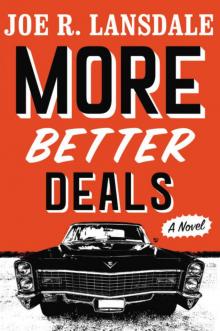 More Better Deals
More Better Deals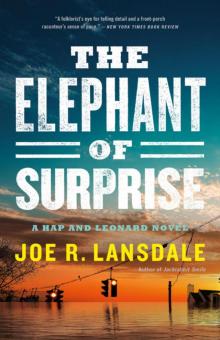 The Elephant of Surprise
The Elephant of Surprise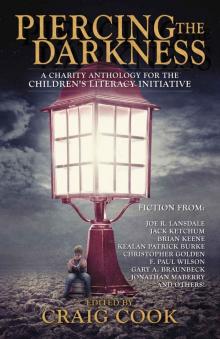 Piercing the Darkness: A Charity Horror Anthology for the Children's Literacy Initiative
Piercing the Darkness: A Charity Horror Anthology for the Children's Literacy Initiative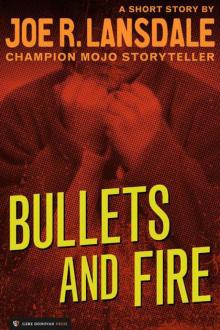 Bullets and Fire
Bullets and Fire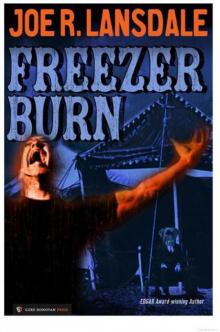 Freezer Burn
Freezer Burn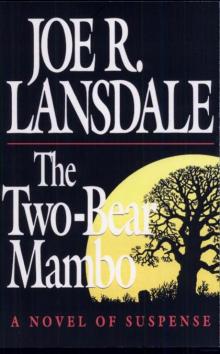 The Two-Bear Mambo
The Two-Bear Mambo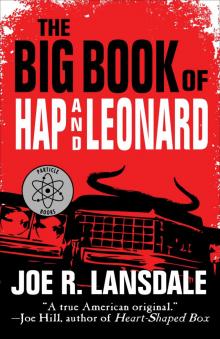 The Big Book of Hap and Leonard
The Big Book of Hap and Leonard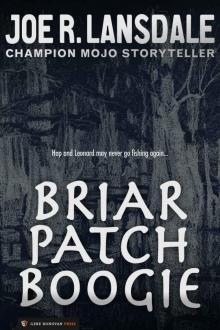 Briar Patch Boogie: A Hap and Leonard Novelette
Briar Patch Boogie: A Hap and Leonard Novelette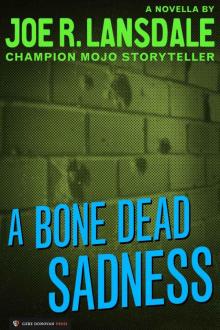 A Bone Dead Sadness
A Bone Dead Sadness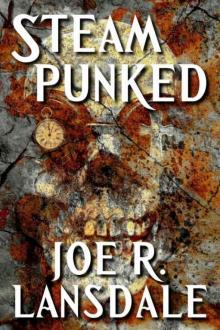 Steampunked
Steampunked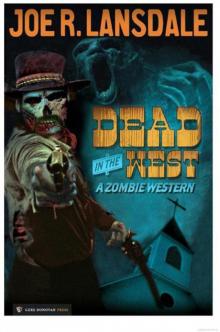 Dead in the West
Dead in the West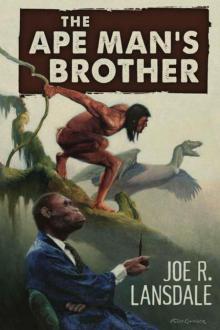 The Ape Man's Brother
The Ape Man's Brother The Bottoms
The Bottoms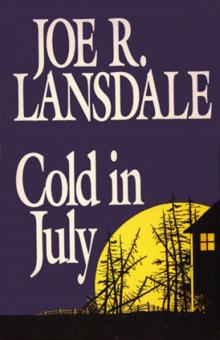 Cold in July
Cold in July The Complete Drive-In
The Complete Drive-In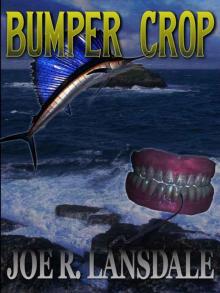 Bumper Crop
Bumper Crop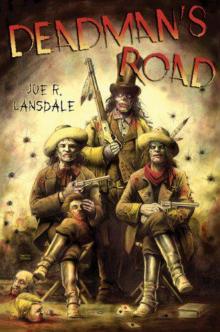 Deadman's Road
Deadman's Road Captains Outrageous
Captains Outrageous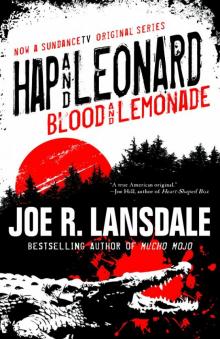 Hap and Leonard: Blood and Lemonade
Hap and Leonard: Blood and Lemonade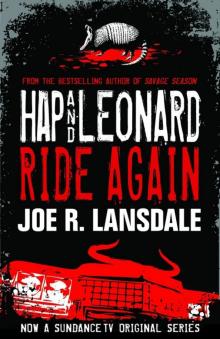 Hap and Leonard Ride Again
Hap and Leonard Ride Again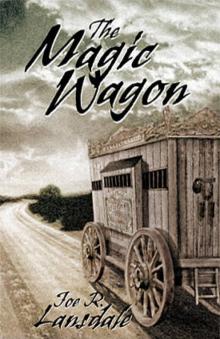 Magic Wagon
Magic Wagon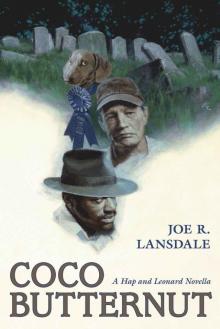 Coco Butternut
Coco Butternut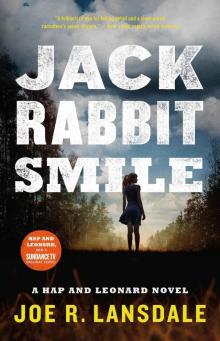 Jackrabbit Smile (Hap and Leonard)
Jackrabbit Smile (Hap and Leonard)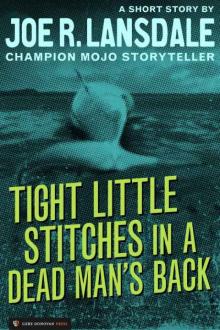 Tight Little Stitches in a Dead Man's Back
Tight Little Stitches in a Dead Man's Back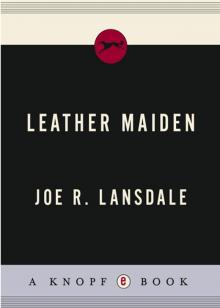 Leather Maiden
Leather Maiden Cold Cotton: A Hap and Leonard Novella (Hap and Leonard Series)
Cold Cotton: A Hap and Leonard Novella (Hap and Leonard Series)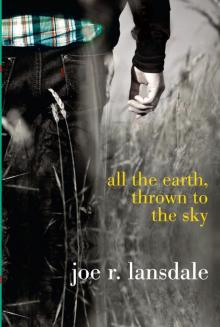 All the Earth, Thrown to the Sky
All the Earth, Thrown to the Sky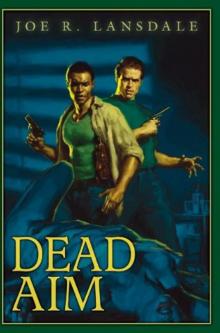 Dead Aim
Dead Aim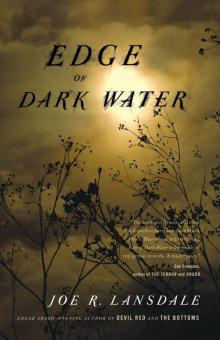 Edge of Dark Water
Edge of Dark Water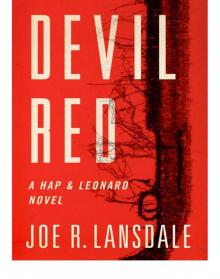 Devil Red
Devil Red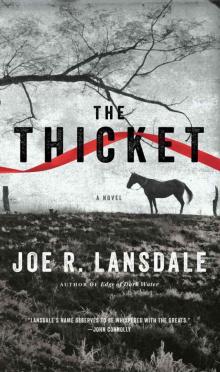 The Thicket
The Thicket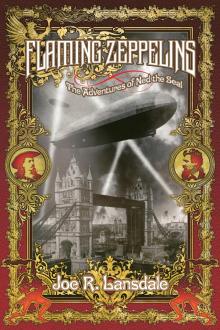 Flaming Zeppelins
Flaming Zeppelins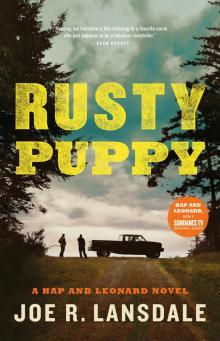 Rusty Puppy
Rusty Puppy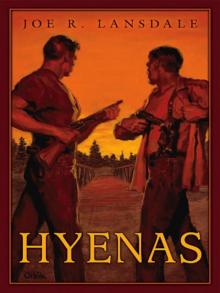 Hyenas
Hyenas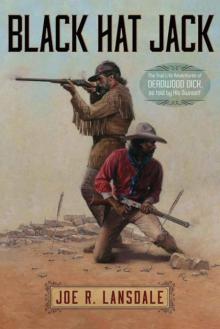 Black Hat Jack
Black Hat Jack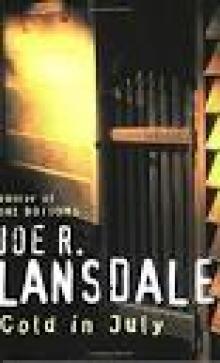 Rare Lansdale
Rare Lansdale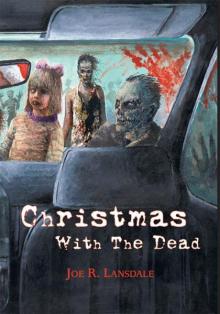 Christmas With the Dead
Christmas With the Dead The Best of Joe R. Lansdale
The Best of Joe R. Lansdale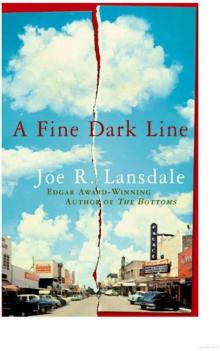 A Fine Dark Line
A Fine Dark Line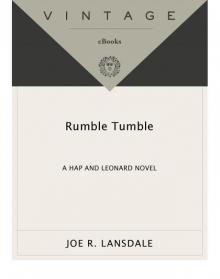 Rumble Tumble
Rumble Tumble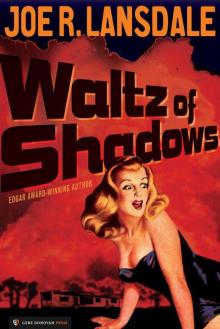 Waltz of Shadows
Waltz of Shadows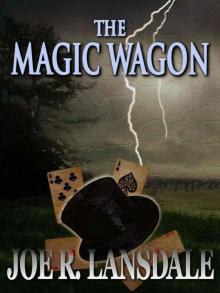 The Magic Wagon
The Magic Wagon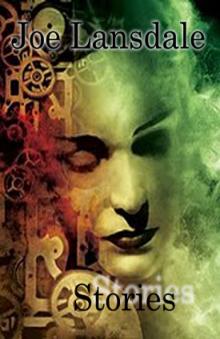 Stories (2011)
Stories (2011)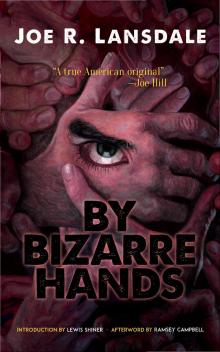 By Bizarre Hands
By Bizarre Hands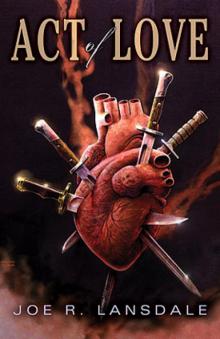 Act of Love (2011)
Act of Love (2011)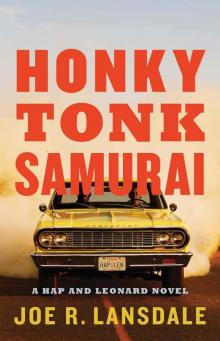 Honky Tonk Samurai (Hap and Leonard)
Honky Tonk Samurai (Hap and Leonard)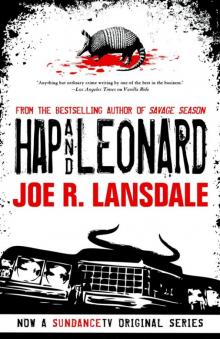 Hap and Leonard
Hap and Leonard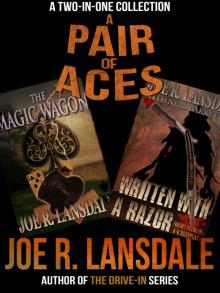 A Pair of Aces
A Pair of Aces Vanilla Ride
Vanilla Ride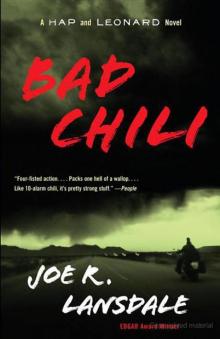 Bad Chili
Bad Chili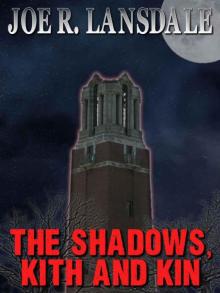 The Killer's Game
The Killer's Game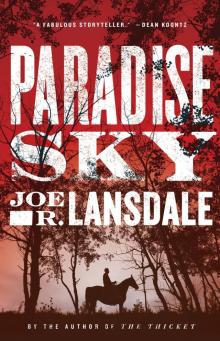 Paradise Sky
Paradise Sky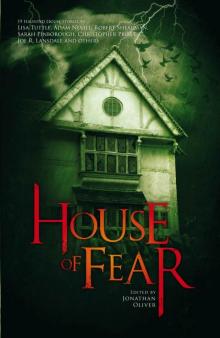 House of Fear
House of Fear Lost Echoes
Lost Echoes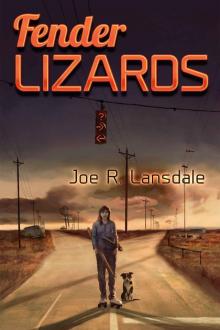 Fender Lizards
Fender Lizards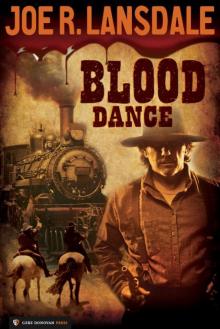 Blood Dance
Blood Dance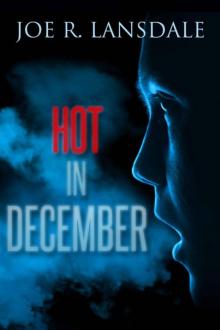 Hot in December
Hot in December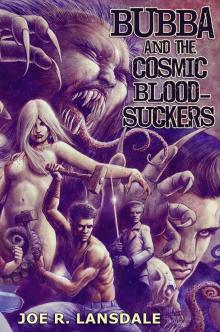 Bubba and the Cosmic Blood-Suckers
Bubba and the Cosmic Blood-Suckers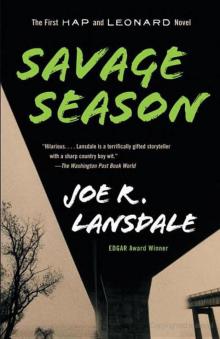 Savage Season
Savage Season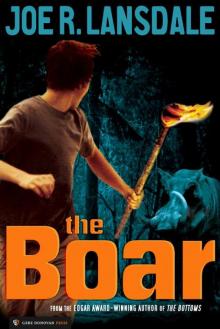 The Boar
The Boar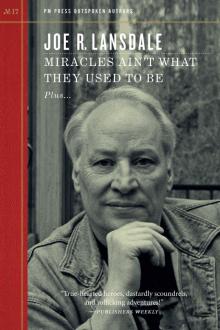 Miracles Ain't What They Used to Be
Miracles Ain't What They Used to Be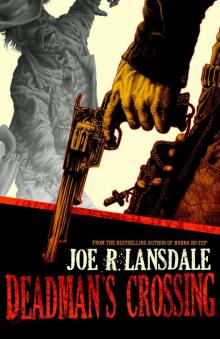 Deadman's Crossing
Deadman's Crossing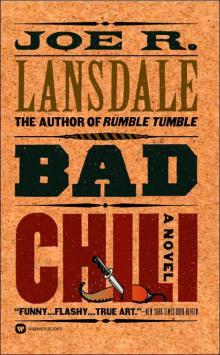 Bad Chili cap-4
Bad Chili cap-4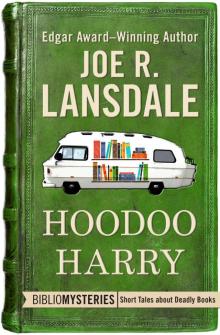 Hoodoo Harry
Hoodoo Harry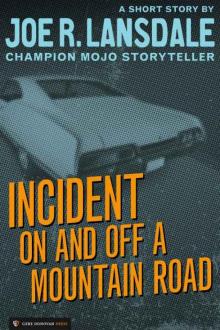 Incident On and Off a Mountain Road
Incident On and Off a Mountain Road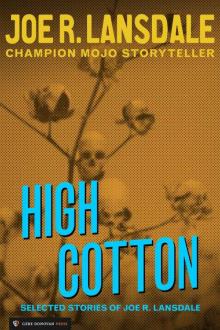 High Cotton: Selected Stories of Joe R. Lansdale
High Cotton: Selected Stories of Joe R. Lansdale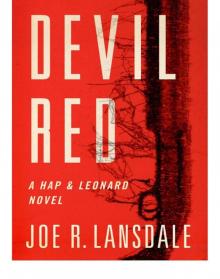 Devil Red cap-8
Devil Red cap-8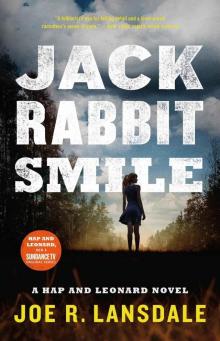 Jackrabbit Smile
Jackrabbit Smile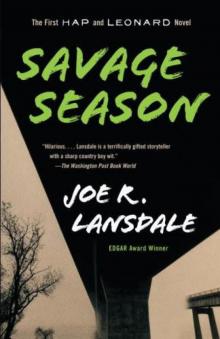 Savage Season cap-1
Savage Season cap-1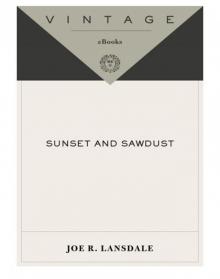 Sunset and Sawdust
Sunset and Sawdust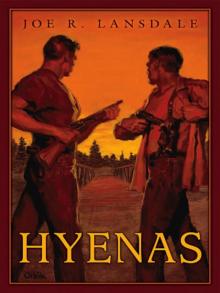 Hyenas cap-10
Hyenas cap-10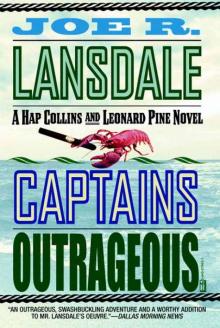 Captains Outrageous cap-6
Captains Outrageous cap-6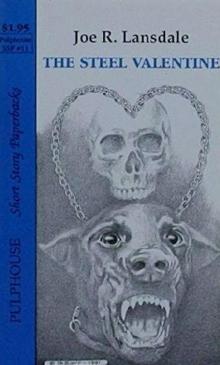 The Steel Valentine
The Steel Valentine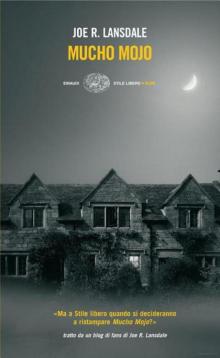 Mucho Mojo
Mucho Mojo Vanilla Ride cap-7
Vanilla Ride cap-7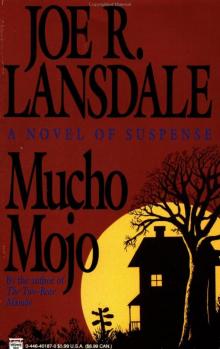 Mucho Mojo cap-2
Mucho Mojo cap-2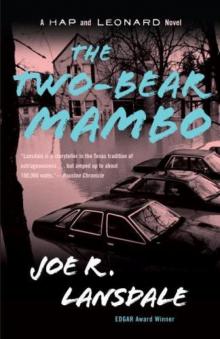 The Two-Bear Mambo cap-3
The Two-Bear Mambo cap-3